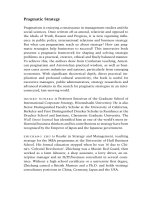Improve self-esteem in just one weekend! docx
Bạn đang xem bản rút gọn của tài liệu. Xem và tải ngay bản đầy đủ của tài liệu tại đây (212.99 KB, 54 trang )
IMPROVE YOUR
SELF-ESTEEM
IN JUST ONE
WEEKEND!
Brought to You By
PLR Canada
TABLE OF CONTENTS
Introduction 3
Where Does our Self-Esteem Come From? 4
What is self-esteem? 6
Do I Have Low Self-Esteem? 9
The Inner Voice 15
Positive Affirmations 19
Self-Nurturing 25
Calling Out “The Troops” 26
Positive Self-Talk 28
Your Environment 32
Kids and Self-Esteem 37
Coping with Criticism 42
Quick Start Guide 45
Conclusion 50
INTRODUCTION
Esteem is a simple word. It is worth and value that we
apply to people, places, and situations. It is the amount of
respect we assess. We have esteem for our world leaders.
We have esteem for places like church and synagogue. We
have esteem for an exemplary performance whether it is in
sports, acting, or simply doing the right thing.
But the most important place we need to apply esteem
is within ourselves. We must maintain our self-esteem in
order to place value on ourselves as a worthy individual in
the world. Self-esteem can affect every single part of our
lives. If that esteem is low, our lives will be dull and gray.
Elevating esteem for ourselves could very well be the key to
happiness in life.
Most people's feelings and thoughts about themselves
fluctuate somewhat based on their daily experiences. The
grade you get on an exam, how your friends treat you, ups
and downs in a romantic relationship-all can have a
temporary impact on your wellbeing.
Your own self-esteem, however, is something more
fundamental than the normal "ups and downs" associated
with situational changes. For people with good basic
self-esteem, normal "ups and downs" may lead to
temporary fluctuations in how they feel about themselves,
but only to a limited extent. In contrast, for people with
poor basic self-esteem, these "ups and downs" may make
all the difference in the world.
People with poor self-esteem often rely on how they
are doing in the present to determine how they feel about
themselves. They need positive external experiences to
counteract the negative feelings and thoughts that
constantly plague them. Even then, the good feeling (from a
good grade, etc.) can be temporary.
Healthy self-esteem is based on our ability to assess
ourselves accurately (know ourselves) and still be able to
accept and to value ourselves unconditionally. This means
being able to realistically acknowledge our strengths and
limitations (which is part of being human) and at the same
time accepting ourselves as worthy and worthwhile without
conditions or reservations.
What we want to do is help you raise your self-esteem
to levels that will enhance your life and the way you view
life. It can make a tremendous difference in your quality of
life. Learning techniques to raise self-esteem can be taught
and put into practice in just a few days. However, it will
take practice to keep your self-worth at the forefront.
We can show you how to improve your self-esteem in
just one weekend! Three short days where you will apply
what this book will show you and that will stay with you as
your life becomes the bright place it should be.
WHERE DOES OUR SELF-ESTEEM
COME FROM?
Our self-esteem develops and evolves throughout our
lives as we build an image of ourselves through our
experiences with different people and activities. Experiences
during our childhood play a particularly large role in the
shaping of our basic self-esteem.
When we were growing up, our successes (and
failures) and how we were treated by the members of our
immediate family, by our teachers, coaches, religious
authorities, and by our peers, all contributed to the creation
of our basic self-esteem.
An adult who has healthy self-esteem was given this
gift in childhood. This could have been done in many ways.
Probably one of the most important is being praised for
accomplishments. Children who are talked to respectfully
and listened to also contributed to healthy self-esteem in
adulthood. These children were hugged often and given
attention and experienced some type of success in school or
sporting activities.
On the other side of the spectrum, we have to identify
the childhood for those adults who have poor self-esteem.
These children were often criticized harshly, were yelled at
or beaten, and were given little attention by those they were
closest to. They were ridiculed and even teased as they
experienced failures in their young lives. They were made
to feel they had to be perfect in order to be valued and
associated failure in situations as a failure of their whole
selves.
It’s sad, isn’t it? To think of a child treated that way.
What’s even sadder is the effect that treatment has on their
lives as adults. We are shaped and molded by our
experiences. Do you recognize yourself?
How we feel about ourselves can influence how we live
our lives. People who feel that they are likable and lovable
(in other words people with good self-esteem) have better
relationships. They are more likely to ask for help and
support from friends and family when they need it. People
who believe they can accomplish goals and solve problems
are more likely to do well in school. Having good
self-esteem allows you to accept yourself and live life to the
fullest.
Self-esteem plays a role in almost everything we do.
People with high self-esteem do better in school and find it
easier to make friends. They tend to have better
relationships with peers and adults, feel happier, find it
easier to deal with mistakes, disappointments, and failures,
and are more likely to stick with something until they
succeed. It takes some work, but it's a skill you'll have for
life.
This book is about how to raise your self-esteem, so we
will focus on the low self-esteem that many people have
these days. You can overcome issues with low self-esteem.
It’s not as difficult as you might think. In fact, all you have
to do is recognize, understand, and use the techniques we
will give you.
One of the initial questions we feel compelled to
address is what exactly self-esteem is.
WHAT IS SELF-ESTEEM?
Some people think that self-esteem means confidence
- and of course confidence comes into it - but it's rather
more than that.
The fact is that there are any number of apparently
confident people who can do marvelous things but who have
poor self-esteem. Many people in the public eye fall into this
category. Actors and comedians and singers in particular
can seem to glow with assurance 'on stage', and yet
off-stage many of them feel desperately insecure.
Indeed, individuals can be stunningly attractive and
world-famous, and seem poised and perfect - yet still, deep
down, find it hard to value themselves. Think of the late
Princess of Wales and Marilyn Monroe and you'll accept, I
think, that public adulation is no guarantee of self-belief.
So, if self-esteem isn't quite the same thing as
confidence, what is it?
Well, the word 'esteem' comes from a Latin word
which means 'to estimate'. So, self-esteem is how you
estimate yourself.
To do that you need to ask yourself certain questions:
· Do I like myself?
· Do I think I'm a good human being?
· Am I someone deserving of love?
· Do I deserve happiness?
· Do I really feel - both in my mind and deep in my guts
- that I'm an OK person?
People with low self-esteem find it hard to answer 'yes'
to these questions. Perhaps you are one of them. If you’re
reading this book, we think you are. Don’t despair. Just
read on!
The concept of self-esteem can be summed up as:
Confidence in our ability to think and in our ability to cope
with the basic challenges of life and confidence in our right
to be successful and happy, the feelings of being worthy,
deserving, entitled to assert our needs and wants, achieve
our values and enjoy the fruits of our efforts.
We also commonly think that self-esteem is merely
about how we feel about ourselves at any particular
moment. While seemingly existing in degrees, we tend to
believe that we have positive or negative self-esteem and
that we make that determination simply by how we feel
about ourselves.
However, our feelings or emotions do not exist alone or
have an independent existence. We do not just simply feel.
Rather, for every feeling or emotion that we have, either
positive or negative, there is a corresponding thought that
we have about ourselves that generates the experience of
self-esteem.
Whether positive or negative, self-esteem is merely
how our psyche experiences the thoughts that we have
about ourselves. If a person has positive thoughts about
himself he will experience positive or good self-esteem. On
the other hand, if the individual has negative thoughts about
whom he thinks he is then he will experience poor or
negative self-esteem.
Therefore, to truly understand what self-esteem is all
about and more importantly to be able to alter it when
necessary for ones wellness or healing, we must first get it
that self-esteem is really about our thinking, and more
specifically about the thoughts that we develop or create
about ourselves. The thoughts or beliefs that we have about
ourselves are crucial in that they determine or create the
structure of our experience of self-esteem and the various
emotions associated with it.
We also tend to think of our self-esteem as being
something that is shaped by the events that take place in
our life, particularly those from our past. We tend to believe
that who we think we are and how we feel about ourselves
is merely the product, effect or caused by the experiences
that we have had in the past – it says that we are who we
are by virtue of what has happened to us as human beings.
More specifically, we tend to think that the cause in the
matter of whom we think we are and our self-esteem is due
to circumstance, situation or others, people, places and
things. We do not tend to think that our self-esteem is
something we actually developed or created. Our personal
self-esteem is shaped by our past and the experiences we
have had in our lives.
We created our thoughts and with it our emotions from
the meaning that we gave to the events that took place in
our life, especially at an early age. We give meaning to
everything in our life including and most importantly to
ourselves. At an early age the meaning that we give an
event tends to be made out to be all about us. While events
do happen it is not the events that are important but rather
the meaning that we give them and especially how we made
it out to be about our identity.
Living in a state of low self esteem can be very
damaging to the quality of life you lead on a daily basis.
Your self esteem is YOUR opinion of yourself, but far too
many people allow others to influence or even make up their
opinion for them. It sounds so very silly, but if you think on
this you will realize how certain events, comments and
encounters helped to "make or break" your self esteem.
Let’s look at some indicators that you might have low
self-esteem.
DO I HAVE LOW SELF-ESTEEM?
While you might already have a good indication that
you are suffering from low self-esteem, it might be a good
idea to explore this a little further.
Take this simple quiz.
Self-Esteem Assessment
Directions: Answer T if the statement is true for you.
Answer F if the statement is false for you.
T F I am able to discuss my good points, skills, abilities,
achievements, and successes with others.
T F I assert myself with someone whom I believe is
violating or ignoring my rights.
T F I am content with who I am, how I act, and what I
do in life.
T F I am not bothered by feelings of insecurity or anxiety
when I meet people for the first time.
T F My life is balanced between work, family life, social
life, recreation/leisure, and spiritual life.
T F I am aware of the roles I played in my family of
origin and have usually been able to make these
behavior patterns work for me in my current life.
T F I am bonded with the significant others in
my environment at home, work, school, at play, or
in
the community.
T F I am able to perform the developmental tasks
necessary to ensure my ongoing healthy
self-esteem.
T F I am satisfied with my level of achievement at
school, work, home, and in the community.
T F I am a good problem solver; my thinking is not
clouded by irrational beliefs or fears.
T F I am willing to experience conflict, if necessary
to protect my rights.
If you selected F for three or more of the preceding
questions, you probably need to work at increasing your
self-esteem. That’s what we’re here for! But that comes a
little later!
There are many, many indicators that a person has
low self-esteem. Consider this list.
People with low self-esteem:
· Consider themselves lost, unworthy of being cared for
· Are poor risk takers
· Operate out of a fear of rejection
· Are typically unassertive in their behavior with others
· Are fearful of conflict with others
· Are hungry for the approval of others
· Are poor problem solvers
· Are fraught with irrational beliefs and have a tendency
to think irrationally
· Are susceptible to all kinds of fears
· Have a tendency to become emotionally stuck and
immobilized
· Have a poor "track record" in school or on the job;
conversely, they sometimes over compensate and
become over-achievers
· Are unable to affirm or to reinforce themselves
positively
· Are unable to make an honest assessment of their
strengths, qualities, and good points; they find it
difficult to accept compliments or recognition from
others
· Have poorly defined self-identities with a tendency to
be chameleons in order to fit in with others
· Are insecure, anxious, and nervous when they are with
others
· Often become overcome with anger about their status
in life and are likely to have chronic hostility or chronic
depression
· Are easily overcome with despair and depression when
they experience a setback or loss in their lives
· Have a tendency to overreact and become
de-energized by resentment, anger, and the desire for
revenge against those whom they believe have not
fully accepted them
· Fulfill roles in their families of origin that are
counter-productive and maladaptive. These roles carry
over into their adult lives
· Are vulnerable to mental health problems and have a
propensity to use addictive behavior to medicate their
hurt and pain. Such addictive behavior can include
alcohol, drugs, food, gambling, sex, shopping,
smoking, working too much, or the search for
excitement, truth, wisdom, and a guru with an easy
guide to the achievement of happiness
Kind of overwhelming, isn’t it? Do you recognize
yourself in any of these statements? Don’t feel alone.
Actually, low self-esteem is actually quite a widespread
problem. And if you suffer from this problem, it can cause
some more – even serious – problems.
Low self-esteem can have devastating consequences.
· It can create anxiety, stress, loneliness and increased
likelihood for depression.
· It can cause problems with friendships and
relationships.
· It can seriously impair academic and job performance.
· It can lead to underachievement and increased
vulnerability to drug and alcohol abuse.
Worst of all, these negative consequences themselves
reinforce the negative self-image and can take a person into
a downward spiral of lower and lower self-esteem and
increasingly non-productive or even actively self-destructive
behavior.
There are actually three “faces” that people with low
self-esteem wear. See if you see yourself in any of these
personalities.
The Impostor: acts happy and successful, but is really
terrified of failure. The imposter lives with the constant fear
that she or he will be "found out." They need continuous
successes to maintain the mask of positive self-esteem,
which may lead to problems with perfectionism,
procrastination, competition, and burn-out.
The Rebel: acts like the opinions or good will of others -
especially people who are important or powerful - don't
matter. The rebel lives with constant anger about not feeling
"good enough." They continuously need to prove that
others' judgments and criticisms don't hurt, which may lead
to problems like blaming others excessively, breaking rules
or laws, or fighting authority.
The Loser: acts helpless and unable to cope with the world
and waits for someone to come to the rescue. The loser
uses self-pity or indifference as a shield against fear of
taking responsibility for changing his or her life. They look
constantly to others for guidance, which can lead to such
problems as lacking assertiveness skills,
under-achievement, and excessive reliance on others in
relationships.
So what does a person with healthy self-esteem look
like? These people exhibit the following qualities.
· Hold themselves as worthy to be loved and to love
others, worthy to be cared for and to care for others,
worthy to be nurtured and to nurture others, worthy to
be touched and supported and to touch and support
others, worthy to be listened to and to listen to others,
worthy to be recognized and to recognize others,
worthy to be encouraged and to encourage others,
worthy to be reinforced as "good" people and to
recognize others as "good" people.
· Have a productive personality; they have achieved
success to the best of their ability in school, work, and
society.
· Are capable of being creative, imaginative problem
solvers; of being risk takers, optimistic in their
approach to life and in the attainment of their personal
goals.
· Are leaders and are skillful in dealing with people.
They are neither too independent nor too dependent on
others. They have the ability to size up a relationship
and adjust to the demands of the interaction.
· Have a healthy self-concept. Their perception of
themselves is in synchrony with the picture of
themselves they project to others.
· Are able to state clearly who they are, what their future
potential is, and to what they are committed in life.
They are able to declare what they deserve to receive
in their lifetime.
· Are able to accept the responsibility for and
consequences of their actions. They do not resort to
shifting the blame or using others as scapegoats for
actions that have resulted in a negative outcome.
· Are altruistic. They have a legitimate concern for
the welfare of others. They are not self-centered or
egotistical in their outlook on life. They do not take on
the responsibility for others in an over-responsible
way. They help others accept the responsibility for
their own actions. They are; however, always ready to
help anyone who legitimately needs assistance or
guidance.
· Have healthy coping skills. They are able to handle the
stresses in their lives in a productive way. They are
able to put the problems, concerns, issues, and
conflicts that come their way into perspective. They
are able to keep their lives in perspective without
becoming too idealistic or too morose. They are
survivors in the healthiest sense of the word. They
have a good sense of humor and are able to keep a
balance of work and fun in their lives.
· Look to the future with excitement, a sense of
adventure and optimism. They recognize their
potential for success and visualize their success in the
future. They have dreams, aspirations, and hopes for
the future.
· They are goal-oriented with a sense of balance in
working toward their goals. They know from where
they have come, where they are now, and where they
are going.
Does this sound like someone you want to be like?
Well, it can be! There are so many steps you can take to
raise your self-worth and stop suffering from low
self-esteem. You will be a much better person for it and
enjoy a wonderfully fulfilling life.
The first point we need to address is your inner
voice.
THE INNER VOICE
Our past experiences, even the things we don't usually
think about, are all alive and active in our daily life in the
form of an inner voice. Although most people do not "hear"
this voice in the same way they would a spoken one, in
many ways it acts in a similar way, constantly repeating
those original messages to us.
For people with healthy self-esteem the messages of
the inner voice are positive and reassuring. For people with
low self-esteem, the inner voice becomes a harsh inner
critic, constantly criticizing, punishing, and belittling their
accomplishments.
Do you ever find yourself berating yourself for
something that you’ve done? Have you ever found yourself
struggling with something that you know you should do but
keep talking yourself out of? That’s your inner voice.
Your inner voice will say things like, “You can’t do
this”, “There’s no way you can succeed”, and “Why bother
trying, you’ll just fail”. Your inner voice is your harshest
critic and the one who will lower your self-esteem the
quickest. You need to change that inner voice from a
negative influence to a positive one.
We all have an inner voice. You should talk back to
it. Combat it. Let it know that YOU are the one in control,
not it! Let’s look at some of the dialogue the inner voice will
tell you and healthy ways to rebut what it is saying.
When the inner voice is unfairly harsh:
"People said they liked my presentation, but it was nowhere
near as good as it should have been. I can't believe no-one
noticed all the places I messed up. I'm such an impostor."
Counteract by being reassuring yourself:
"Wow, they really liked it! Maybe it wasn't perfect, but I
worked hard on that presentation and did a good job. I'm
proud of myself. This was a great success."
If the inner voice is unrealistically generalizing as in:
"I got an F on the test. I don't understand anything in this
class. I'm such an idiot. Who am I fooling? I shouldn't be
taking this class. I'm stupid and I don't belong in college."
Tell that inner voice something specific:
"I did poorly on this one test, but I've done O.K. on all the
homework. There are some things here that I don't
understand as well as I thought I did, but I can do the
material-I've done fine in other classes that were just as
tough.”
The inner voice might also be extremely illogical.
"He is frowning. He didn't say anything, but I know it means
that he doesn't like me!"
Tell that voice something that is purely logical.
"O.K., he's frowning, but I don't know why. It could have
nothing to do with me. Maybe I should ask."
Finally, the inner voice will take things to extremes.
"She turned me down for a date! I'm so embarrassed and
humiliated. No one likes or cares about me. I'll never find a
girlfriend. I'll always be alone."
It’s time to tell that inner voice things aren’t nearly
as bad as they make them out to be.
"Ouch! That hurt. Well, she doesn't want to go out with me.
That doesn't mean no one does. I know I'm an attractive
and nice person. I'll find someone."
In general, when that inner voice begins putting you
down, counteract with a positive statement. Don’t let that
voice overtake you and talk you into something that just
isn’t true. You are in control – not the inner critic. Take
charge and begin the journey toward more positive thinking!
One way to do this is through positive affirmations.
This isn’t new-age anything, it’s simply a way for you to
infuse positive self-talk into your life and calm that negative
inner voice.
Utilizing positive affirmations can be a very powerful
tool for transforming what a person thinks about himself and
as a result improve the individual’s self-esteem. Consistent
use of positive affirmations will transform the negative
beliefs about who a person thinks he is into positive ones,
will begin to alter the basis and structure of his self talk or
inner voice and produce a transformation from poor
self-esteem to positive self-esteem.
While utilized in a various ways, working with
positive affirmations will be more effective when delivered
through or combined with therapeutic relaxation music.
What therapeutic relaxation music does to enhance the
effect of positive affirmations is to create a very relaxed
audio environment for the individual to become even more
open or suggestive to the language of positive affirmations.
When you use music while telling yourself positive
affirmations, you will be more relaxed and more open to
accepting the positive comments you are telling yourself.
We found a wonderful music CD at Wal-Mart that
helps to calm the soul and transform negative thoughts into
positive thoughts. These music CD’s are available
everywhere, however. Just look for something that has
calming music along with some soothing background noise
like waves crashing on a shore or water that is flowing.
The key to the effective use of positive affirmation in
this or any other type of intervention is consistency. The
self-image and the negative thoughts about who a person
thinks he is that generates his experience of poor or
negative self-esteem is well established in the his belief
system. In many cases the development of a negative
self-image took years to create and has been reinforced
through repetitive behavioral validation.
Because positive self-affirmations are key in
developing healthy self-esteem, let’s look at these a bit
more closely.
POSITIVE AFFIRMATIONS
Positive self-affirmations are healing, positive scripts
you give to yourself to counter your negative inner voice.
They can help you free yourself from the over-dependence
you have on other people’s opinions, attitudes, or feelings
about you and help you feel good about yourself.
When you visualize a new order and sense in your life,
you can work toward a more positive attitude and take
responsibility for your own health and emotional stability.
You will let go of negative emotional baggage and be able to
deal with your life in a realistic and positive manner.
Positive self-affirmation will help you resolve negative
feelings from the past so you can face the present with a
less obstructed view. In doing this, you will give yourself
permission to grow, to change, to take risks, and to create a
better life for yourself.
You will take a healthy self-oriented route in your life
so that you can let go of the people and thoughts that drain
your emotional resources and keep you from experiencing
full personal health. When you recognize that you have a
right to be a healthy and happy human being, you will have
a fighting change at achieving your full potential.
Success prophecies, when visualized, imagined, or
believed in, do come true. It’s time for you to believe that
fully. This is how positive affirmations can affect you and
your inner being. The biggest plus is that the negative inner
voice will be quieted allowing you to find the positive inner
voice that will help you become a fully happy individual.
There are three areas of self-affirmations. Try using
any of these statements the next time you are feeling that
negativity come over you.
I am: A statement of who you are
This is a positive affirmation of a real state of being
that exists in you. You can achieve a full list of I am
statements by taking a personal positive inventory of your
attributes, strengths, talents, and competencies. Examples
include:
I am competent I am energetic
I am strong I am enthusiastic
I am intelligent I am relaxed
I am beautiful I am joyful
I am a good person I am trusting
I am caring I am generous
I am loving I am courageous
I am smart I am forgiving
I am creative I am open
I am talented I am sharing
I can: A statement of your potential
This is a positive affirmation of your ability to
accomplish goals. It is a statement of your belief in your
power to grow, to change, and to help yourself. Examples
include:
· I can lose weight I can grow
I can stop smoking I can heal
I can handle my children I can let go of guilt
I can gain self-confidence I can let go of fear
I can take risks I can change
I can be a winner I can be positive
I can be strong I can be a problem
solver
I can pass calculus I can handle my own
problems
I can laugh and have fun I can be honest with my
feelings
·
I can be assertive I can let go of being
compulsive
I can control my temper I can succeed
I will: A statement of positive change in your life
This is a positive affirmation of a change you want to
achieve. It is a positive statement of what you want to
happen. It is a success prophecy. Examples include:
· I will like myself better each day.
I will gain emotional strength each day.
I will control my temper today.
I will give others responsibility for their lives today.
I will grow emotionally stronger each day.
I will smile more today.
I will praise my children today.
I will feel good things about me today.
I will sleep easily tonight.
I will feel less guilt each day.
I will face my fears courageously today.
I will take on only what I can handle today.
I will take care of me today.
I will challenge myself to change today.
I will manage my time better today.
I will handle my finances wisely today.
I will take a risk to grow today.
The daily use of these "I'' statements is another form of
self-affirmation designed to counter negative self-concept. It
can result in a positive attitude, optimism, and can motivate
you toward emotional growth and progress.
Another good way to focus on the positive in your life
is to make up some affirmation cards and place them in
places where you will see them often.
These forms of affirmation are words, phrases, or
statements written on 3 x 5 index cards and placed where
you can see them daily and be reminded of positive aspects
about you. Every time you see these affirmation cards they
will remind you to affirm yourself about these positive
qualities or attributes. State all affirmations in a positive
way.
Here are some places to put your affirmation cards:
mirror in bathroom dashboard of car
mirror on dresser desk at office
closet door desk at home
refrigerator door in your wallet
front door in your brief case
bedroom door in books you use at work
or school
at your telephone
Try some of these words to put on your affirmation
cards:
· bright capable
creative strong
intelligent beautiful
smart giving
quick peaceful
loving hopeful
caring responsible
successful problem solver
calm quiet
pretty handsome
relaxed enjoyable
Consider some of these phrases as well:
· think happy take it easy
be calm think wisely
take action work smart
do it take the time
do it now have fun
be a winner relax and enjoy
take a risk sit back
dare to be different step back
seize the blessing take the lead
get in control give them space
let go believe in me
let them be trust in me
let it be enjoy good health
Affirmation statements can also be used to remind
yourself that you are worthy and that you need to remain
positive in all situations.
· I can be a winner.
I am the best friend I have.
I have solved problems like this before.
I have the ability to handle this.
I am a capable human being.
I deserve to love and to be loved.
I am a skillful and artistic person.
I can show others a good example.
Letting go is best for them and for me.
They will thank me in the future.
Nothing is worth losing my sanity over.
I am responsible only for my own feelings.
I owe no one explanations for my behavior, which
is legally, morally, and ethically correct.
I deserve to have my rights recognized.
I am a deserving human being.
I deserve to enjoy the fruits of my labor.
I deserve to be rewarded for what I do.
I love myself for who I am.
It is OK to be selfish if I don't hurt anyone.
I like the way I handle problems.
I am able to handle any problem I face.
I have the right to feel the way I do.
My children will benefit from my healthy changes.
My children will survive my healthy changes.
My family will benefit from my relaxing more.
I deserve to relax more and take it easy.
There are beautiful things happening in my life
daily.
I experience the excitement of growth daily.
Change is a blessing I am working toward.
Taking risks is the path to growth.
I grow in love daily.
I face each new day as a race to be won.
I am winning in the race of life.
I am a rich treasure ready to be found.
Let others know who I am.
Say hello to a new person today.
Open up to be loved today.
Be responsible. Relax!
Letting go is loving
You will be free of guilt today.
To be loved I must love.
God does not make junk.
There are opportunities in life to be tried.
My possibilities are endless.
Success is to be enjoyed.
Open myself up with one new person today.
Belief in self is a step toward personal growth.
I can handle all changes that come my way.
There is nothing I cannot handle.
Smile and let others in on the secret.
When you make a conscious effort to put these
positive affirmations into your daily routine, you will be well
on the way toward lifting your self-esteem and realizing
your full potential as a meaningful and wonderful person!
There are so many other steps you can to raise your
self-esteem and become everything you were meant to be.
Let’s move on!
SELF-NURTURING
Rebutting your critical inner voice is an important step,
but it is not enough. Since our self-esteem is in part due to
how others have treated us in the past, the second step to
more healthy self-esteem is to begin to treat yourself as a
worthwhile person.
Start to challenge past negative experiences or
messages by nurturing and caring for yourself in ways that
show that you are valuable, competent, deserving and
lovable. There are several components to self-nurturing:









